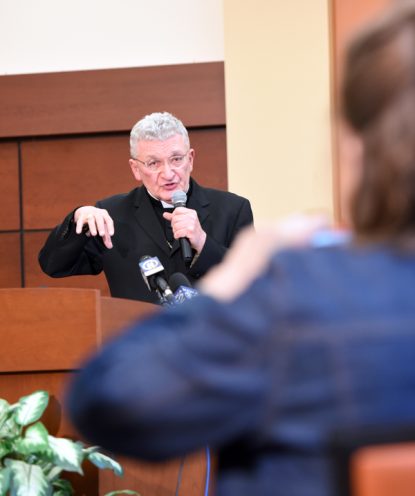
Bishop David A. Zubik of Pittsburgh addresses a media conference announcing the reorganization of parishes in the diocese. (CNS photo/Chuck Austin, Pittsburgh Catholic)
PITTSBURGH (CNS) — After three years of discussions, Pittsburgh Bishop David A. Zubik said the 188 parishes of the diocese will be placed into 57 groupings that will eventually become new parishes.
Bishop Zubik announced the plan April 28 during a media conference, saying the effort was designed to promote vibrant faith and revitalize parishes.
The announcement detailed the maximum number of weekend Masses per grouping and timelines for each grouping to work toward mergers and clergy assignments.
The move to groupings — part of a diocesan planning initiative called On Mission for The Church Alive! — were to take effect Oct. 15. No church closings are part of the plan’s first phase.
The groupings are expected to merge into new parishes between 2020 and 2023, however.
“No matter how the church is structured, it is the responsibility of all the faithful — bishops and priests included — to make faith, hope and love remain alive in the world around us,” he said in announcing the plan, the result of meetings and discernment that began in 2015.
“Our churches will continue to be places where local Catholics gather to be nurtured and nourished by the God who loves us. Yet, On Mission! gives us a new context and new opportunities to make ever more alive a faith that abides both within and outside of our church walls,” he said.
[hotblock]
The decision on the grouping were read in letters sent to each parish at Masses the weekend of April 28-29. Bishop Zubik wrote that the initiative is designed to offer a deeper relationship with Jesus and the Catholic Church to practicing and inactive Catholics, as well as those who have never been baptized.
The diocesan plan is being driven by reduced Mass attendance and participation in the sacraments and a declining number of priests.
The diocese reported that since 2000, Mass attendance decreased more than 40 percent and participation in the sacraments fell 40 percent to 50 percent. Meanwhile, the number of diocesan priests available for active ministry is expected to decline from about 200 to 112 by 2025.
Launched in April 2015, the planning process invited Catholics to envision how parishes, schools and ministries can best respond to the changes in their communities. The diocese said nearly 30,000 parishioners participated in meetings and provided feedback that guided the decisions announced by the bishop.
“For three years, we have labored to discern how to best position our local church for the future,” Bishop Zubik said in the letter. “We must respond to the reality that populations have shifted, that many Catholics have drifted away from Mass and that we will have fewer priests.
“We need to share and mobilize our resources to draw people deeper into the faith, seek the lost and serve those in need.”
During the process, key consultative groups recommended that Bishop Zubik increase to 57 groupings from 48 groupings endorsed by a commission of clergy and lay leaders that initially studied church needs.
Under the new setup, a priest who serves as administrator will lead a clergy team for each grouping. An administrator has all the rights and responsibilities of a pastor but does not have a specified term to serve.
Clergy teams may include priests who are parochial vicars and parish chaplains, as well as permanent deacons. Priests are also being assigned as institutional chaplains to major hospitals, nursing homes, colleges, high schools and correctional institutions.
The maximum number of weekend Masses per grouping is based on the number of priests assigned there and other factors. Under canon law, the number cannot exceed three Masses per priest who has parish responsibilities. Priests who live at a parish, but whose duties are elsewhere, are not included in the count.
During the first year, clergy were to focus on building relationships with and among their parishioners.
“I truly believe that change can bring new life and joy,” Bishop Zubik said during his announcement. “I realize that such transformation is rarely easy, especially in the heartfelt matters of faith and parish life. I know that this change will require us — the faithful, the clergy, and myself — to let go of some things that are precious and familiar.
“I also am convinced that our clergy and faithful have what it takes to form deep and lasting relationships within their groupings and to create welcoming communities.”
***
De Witt writes for Pittsburgh Catholic, newspaper of the Diocese of Pittsburgh.
PREVIOUS: Woman maps the worldwide Catholic Church, aiding its mission
NEXT: Ohio diocese announces bishop undergoing treatment for leukemia


Close them and they will leave.